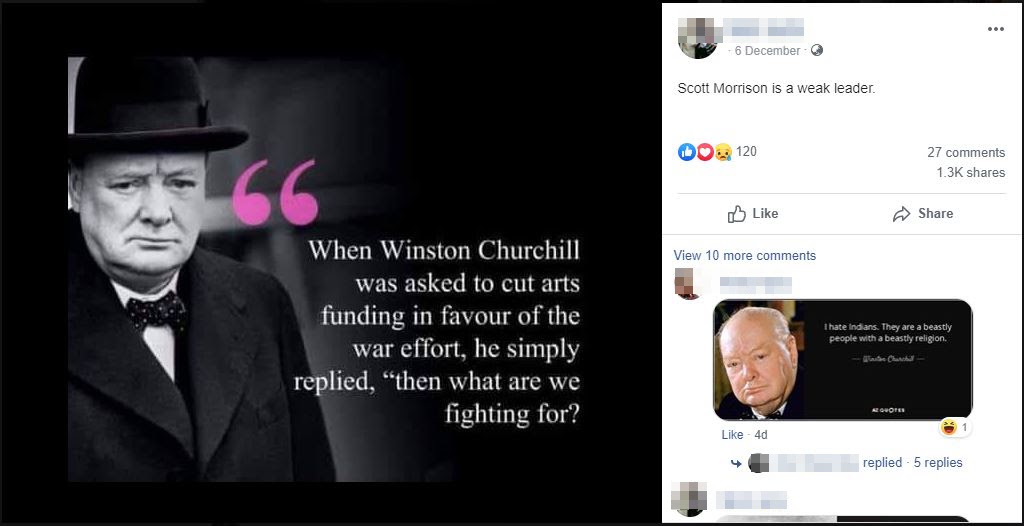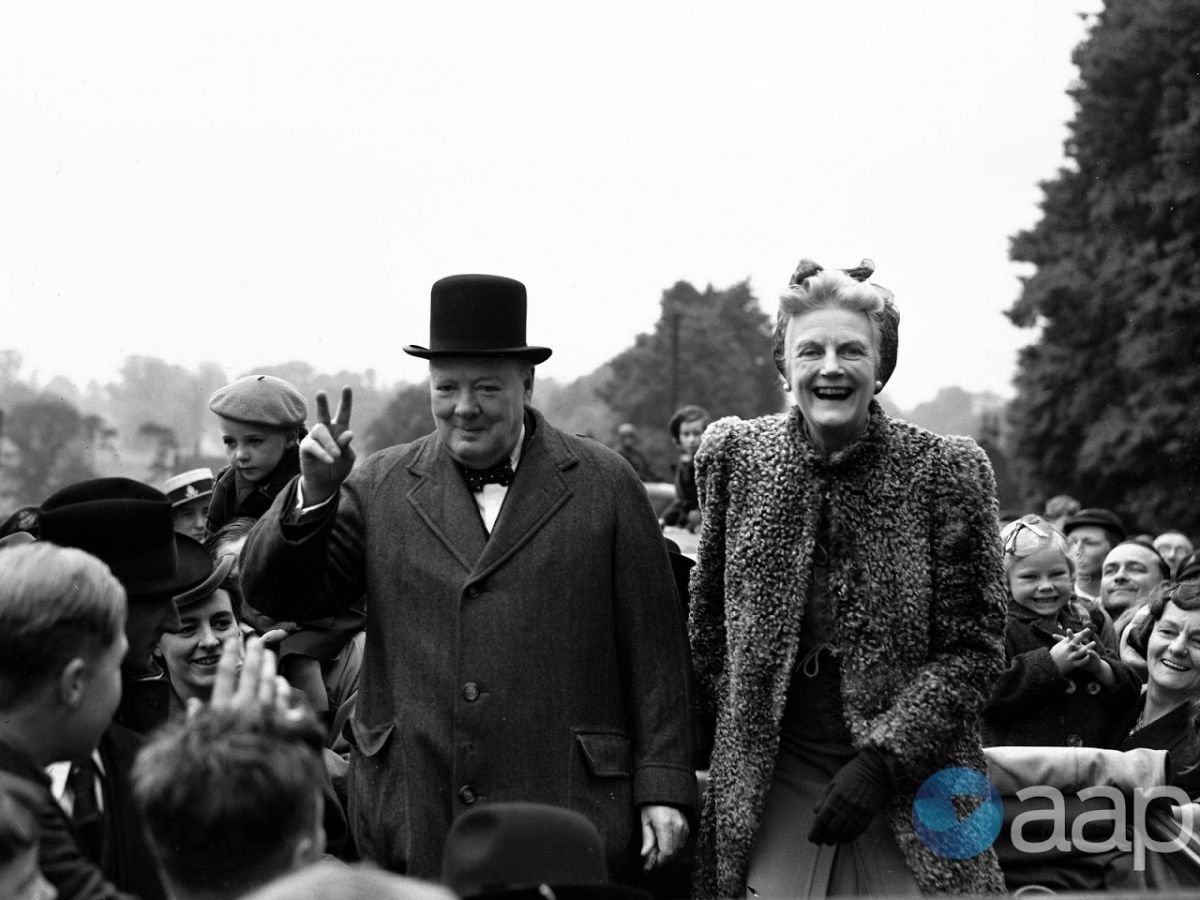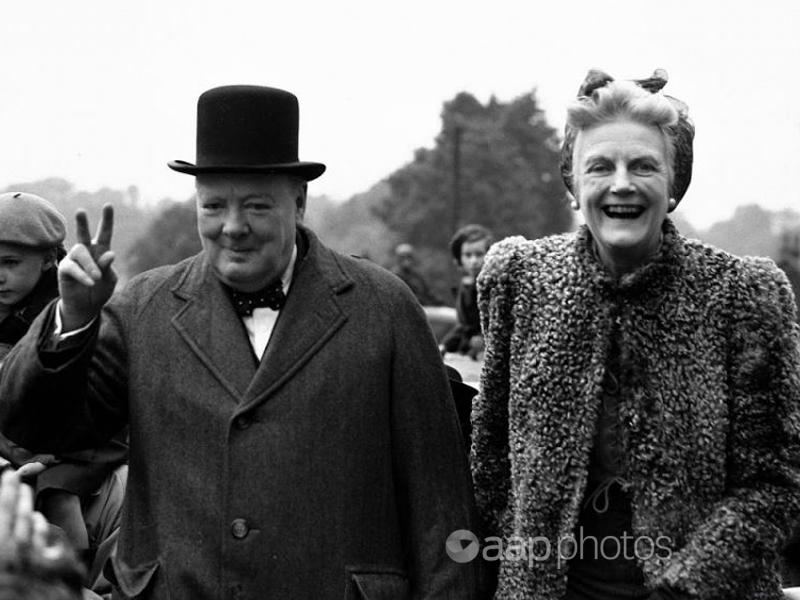The Statement
A quote attributed to Britain’s art-loving wartime prime minister, Winston Churchill, has been circulating on social media after Australia’s current prime minister, Scott Morrison, announced a restructure of the public service.
Mr Morrison’s move means that, from February 2020, no department will have “Arts” in its title. It has prompted many people to share a post which features a photo of Churchill and reads: “When Winston Churchill was asked to cut arts funding in favour of the war effort, he simply replied, ‘then what are we fighting for?’.”
AAP FactCheck examined a version of the post from an Australia user on December 6, 2019 to determine if the statement was made by Churchill as claimed. The post in this instance includes a caption that reads: “Scott Morrison is a weak leader”.
The post has gathered more than 1,300 shares, 100 reactions and 20 comments.
AAP FactCheck found more than 50 versions of the post – attracting more than 9,000 shares between them – published online since Mr Morrison’s December 5 announcement.

The Analysis
Winston Churchill led Britain to victory in World War II and built a reputation as an orator through his impassioned speeches.
Churchill researchers and fact-checkers alike have probed the veracity of the art quote story, which purportedly showcases the former prime minister’s support for the arts as war raged across the globe.
US fact-checking group Snopes found it to be false after, in a parallel to Australia’s recent spate of posts, the alleged quote appeared in meme form in 2017 as President Donald Trump pondered cuts to his government’s arts and humanities agency.
PolitiFact echoed that verdict in a check from April, 2019.
As cited in both fact checks, US historian and Churchill authority Richard Langworth has previously addressed the origin and legitimacy of the quote.

“This alleged quotation was raised some few years ago in the Village Voice and is all over the web, but it is not among Churchill’s 15 million published words in speeches, papers, letters, articles or books,” he wrote in a 2009 blog post.
Timothy Riley, chief curator of the National Churchill Museum agreed that the supposed quote is without foundation.
“There is no written record to confirm Churchill wrote those words and or even a recollection by the statesman’s contemporaries that Winston Churchill uttered the statement in conversation,” Mr Riley said in an email to AAP FactCheck.
Mr Riley said the quote had form and even he, a Churchill expert, had mistakenly assigned it to Churchill in the past.
“It is (a) common misattribution,” he told AAP FactCheck.
“One, I must confess, I cited erroneously many years ago.”
Churchill had a well-known passion for painting, Mr Riley said, and once compared composing a piece to fighting a battle in a 1921-22 essay entitled Painting as a Pastime.
“Art, for Churchill, sharpened his mind, which served him well in all of his endeavors,” Mr Riley said.
This view of Churchill’s stance on the arts is in keeping with a speech he gave to the Royal Academy in 1953.
“The arts are essential to any complete national life. The nation owes it to itself to sustain and encourage them,” Churchill said.
Lee Pollock, interim executive director at The International Churchill Society, told AAP FactCheck the Facebook post quote “sounds Churchillian but there is no attribution for it”.
“But Churchill believed in the importance of the arts to society,” he said.
Britain, in fact, did make efforts to ensure the sustainability of the arts during World War II, establishing the Committee for the Encouragement of Music and the Arts.
But this initiative was launched in January 1940, before Churchill succeeded Neville Chamberlain as prime minister in May that year.
AAP FactCheck also searched for the quote in the International Churchill Society quotes archive and the “50 Sir Winston Churchill Quotes to Live By” collated by BBC America, but could not find any evidence to link it to him.
The Verdict
Based on the evidence, AAP FactCheck found the attribution of the “then what are we fighting for” arts funding quote to Winston Churchill to be false. Despite his affinity for the arts there is no record of the British leader writing or saying these words.
False – The primary claim of the content is factually inaccurate.
First published December 10, 2019, 15:09 AEDT
Updated December 16, 2019, 12:27 AEDT. Copy added in third paragraph to clarify that scope of check is to determine whether Churchill uttered the attributed phrase.


















